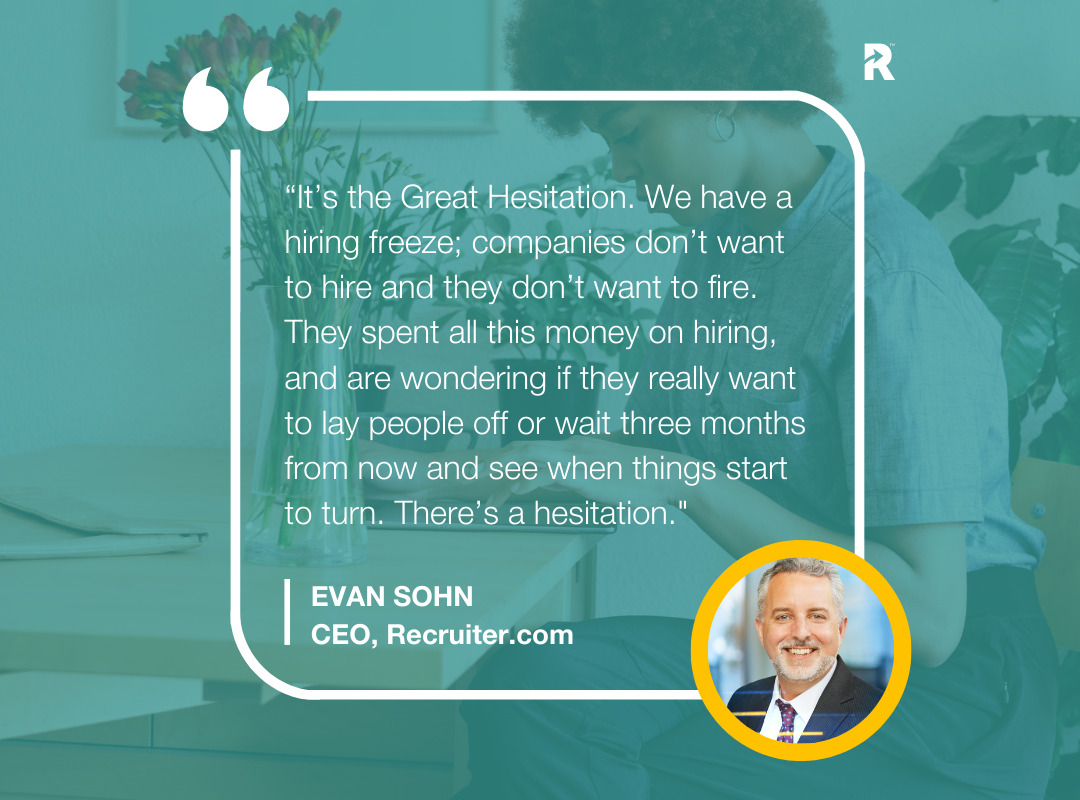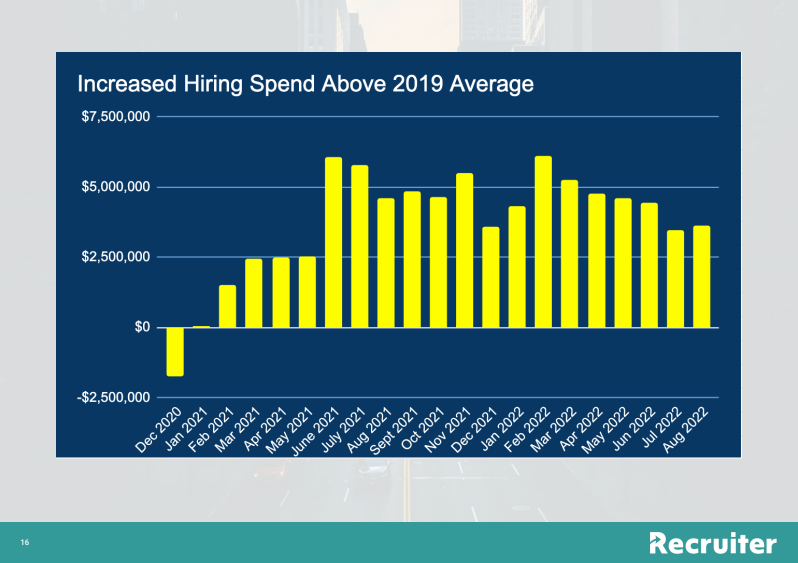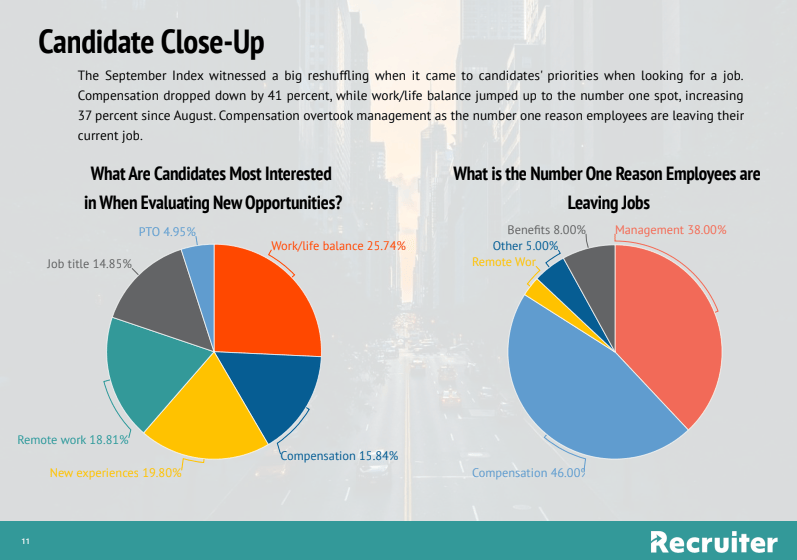How to Use This Looming Recession as the Perfect Opportunity to Hire New Talent

The job market has felt like a rollercoaster over the past two years. From the start of the pandemic, riddled with layoffs and people working remotely, to the Great Resignation, where everyone was quitting and realizing new priorities. Then, we came to the Job Hopper economy, where employees decided they would only stay for a year or two, maybe even less. Companies were rapidly hiring and struggling to keep talent, and the talent they did keep started “quiet quitting.” As if that wasn’t enough, the economy is slowing down, and inflation is skyrocketing. Many experts speculate that the United States might have an economic downturn in the coming months.
Evan Sohn, CEO of Recruiter.com , described this part of the tightening labor market as the “Great Hesitation.”
While on CNBC, Sohn commented on the current job market: “It’s the Great Hesitation. We have hiring freezes; companies don’t want to hire, and they don’t want to fire. They spent all this money on hiring practices and are wondering if they want to lay people off or wait three months from now and see when things start to turn. There’s a hesitation.”

The Recruiter Index survey from September 2022 has confirmed the hesitation. The recruiter sentiment score was 3.5/5. We use this number to indicate how recruiters feel about the current job market.
Recruiters are asked to rank the job market on a scale of one to five, with one meaning a cold job market and five representing a hot job market. With a 3.5, recruiters think the job market is still relatively warm, although more companies are laying employees off, and a recession might be near. This sentiment only decreased by .1 point since August 2022. Recruiters also reported that even though a recession might come, candidates are still quitting.
“It’s still a candidate’s world. Candidates certainly think it’s still their world in terms of their ability to decide what roles they want,” said Sohn. “Job mobility is not going away anytime soon.”
One reason that job mobility is high is that it’s easier now for quality candidates to apply and interview, thanks to remote interviewing. Many companies are still doing layoffs, which can cause the remaining employees to become active job seekers.
If you couldn’t find or source the talent, you needed in the past few months, this possible recession might be the perfect opportunity to snag some new talent. Keep reading to learn how to use a recruiting process in a downturn.
How a Recession Can Help You Hire the Best Talent
Remember that the recession won’t last forever. If you foresee your company making it through the difficult time, this recession can be the perfect opportunity to find qualified talent. That’s because many companies will need to lay off some of their top skills to reduce their spending.
This means that all of those qualified employees will now be looking for new opportunities. Most companies won’t hire as much during a recession as they don’t have enough money. This means there will be less competition from other companies trying to snatch top talent off the market.
This puts many business owners in a unique situation to come out of recession even stronger and get a head start compared to companies that aren’t hiring or are doing mass layoffs.
Many companies have done similar things in past recessions and have succeeded. In 1970, Microsoft prioritized hiring during one of the worst economic markets; at that time, they were just a startup. Now, they are a trillion-dollar company. Hewlett-Packard also did this when the United States closed its military labs in the 1940s. Many organizations struggled financially, but Hewlett-Packard prioritized hiring and found some of the best talent.
If you’re a startup company, this recession is the perfect time to get some great talent who might not otherwise be available. Our September 2022 Recruiter Index also showed that many of the roles that recruiters are working on are backfilled, and there aren’t as many new active roles. Many companies are still trying to fill positions open during the Great Resignation.
How to Hire During a Recession
If this is your first recession as a company, you can also look at how other companies have handled previous recessions. Most business owners will likely remember the Great Recession of 2008. The Great Recession lasted only eighteen months, but it took years to recover all the lost jobs.
But if hiring during a recession is your chance to grab top talent, you’ll need effective hiring strategies to ensure that you hire carefully and make it out of the recession. This is your chance to set your business up for success.
Some research was done over the past three recessions. They surveyed companies who went through those three recessions, and 9% of the companies came out the other end because they used a “progressive focus.” These companies did have some layoffs and financial cutbacks, but they did so meticulously.
These companies focused their recruitment efforts on long-term rather than short-term goals. They avoided thinking in black-and-white goals, like deciding whether to hire or fire. Instead, they did both of them. They could retain their top employees who were in crucial positions, but they were also able to hire top talent who helped carry them over the finish line.
Ensure You Can Handle More Candidates
When companies use a hiring freeze, there will be fewer job postings for other candidates to apply for. This means that if you’re one of the few companies hiring, you’ll receive more candidates.
Our Recruiter Index has found that this has already started happening. In September, there were at least two candidates applying for every job posting. If you plan on hiring during the recession, you’ll need resources to handle this surge in applications.
While it’s great that you’ll have more qualified candidates to choose from, make sure that you have a talent acquisition team who can adequately sift through all of these applications. If you don’t have the money to hire an internal recruiter, you may consider hiring recruiters you can contract monthly.
Decide What Positions Are Most Important
During a recession, it is almost impossible to avoid layoffs. However, the key is to be strategic and take your time in evaluating each position. Remember that this will reflect on your employer branding and your ability to hire great talent in the future.
Some job descriptions are vital to the success of your business, and if you have talented employees, you should try and keep those employees. If you start laying off employees without any strategic plan, then you could ruin employee engagement and morale, lose great employees, and hurt your employer branding in the long run.
It would be best if you also considered what positions might be easier to hire in the long run. For example, if you have employees who have niche skills and talents, keep in mind that it might be harder to replace them. You might save money by laying them off in the short term, but in the long run, you may spend more money trying to hire a replacement. Keep in mind that it costs an average of $4,700 to hire a new employee, but this can cost even more if it’s a specialized position or you’re trying to find someone with niche skills.
According to recent reports, spending on hiring has also increased as employees are dealing with higher employee turnover and difficulty finding suitable candidates.

Hire Carefully
Hiring during a recession can be risky, but it can also yield great rewards. However, you must ensure you’re entirely vetting the candidates you hire. A bad hire can cost your company between $17,000 to $240,000 , depending on their position and situation.
This can hurt your business’s bottom line in the middle of a recession. Hopefully, you’ll have enough candidates to choose from to select the most qualified candidate. You may also want to consider doing a few rounds of interviews or using other tools to help you assess the candidate’s qualifications. Since the job market may be less competitive than usual, you may be able to add one extra round of interviews or assessments without it hindering the number of candidates that apply for the position.
It would be best if you also had a team of qualified people to assess the candidates’ abilities. Having recruiters on your team is helpful, but you’ll also need advice from the hiring manager and possibly other teammates familiar with the job’s tasks. For example, if you’re hiring a software engineer, you may need to ask another engineer what they think of the potential candidate.
Focus on Your Current Talent
While you’re hiring, you need to try and improve your employee retention as well. Layoffs and recessions can make your current employees anxious about their job security. If they’re worried they might be next, they might be brushing off their resume and looking for other opportunities.
However, this could mean you lose out on great talent and have to spend even more money on hiring. Plus, your employees’ anxiety might get in the way of their productivity or happiness at the company.
There are a few ways to help you retain talent. You can always send out anonymous surveys for employees to take so that you can get a gauge of the workforce’s feelings. However, the Recruiter Index from September also showed why candidates are leaving their companies.
Forty-six percent of candidates left because of poor compensation. Raising salaries during a recession can be challenging, but you can have open conversations with your employees. If you and hiring managers ignore the problem, it can cause issues with your employees.
You may also want to ensure your managers do their best to support their employees. That’s because 38% of candidates said they left because of poor management at the company. If you can address both of those significant concerns, you may have a better chance of improving your employee retention rate.

Find New Ways to Save Money
Instead of saving money by letting go of employees or using a hiring freeze, try looking at other expenses to cut costs. For example, can you hire a part-time person to do the same job as a full-time person? Do you have any software subscriptions that you don’t use anymore? After you go through and eliminate unnecessary expenses, you can try finding software or solutions that can help you streamline your hiring process.
For example, Recruiter.com offers powerful AI-sourcing software. When one-third of a recruiter’s workweek is spent sourcing candidates, using this talent-sourcing software can save time and money. The software can source candidates and send them directly to your email. Once you’ve decided on a few select candidates, you can send optimized, automated emails to candidates to recruit them for a position.
This can be useful when looking for specific candidates with niche requirements. However, it also helps you source a new pool of candidates who can fill your open positions.
If you’re interested in learning more about how our recruiting solutions can help you save money and snag the best talent during the next recession, contact us today !
Get the top recruiting news and insights delivered to your inbox every week. Sign up for the Recruiter Today newsletter.

